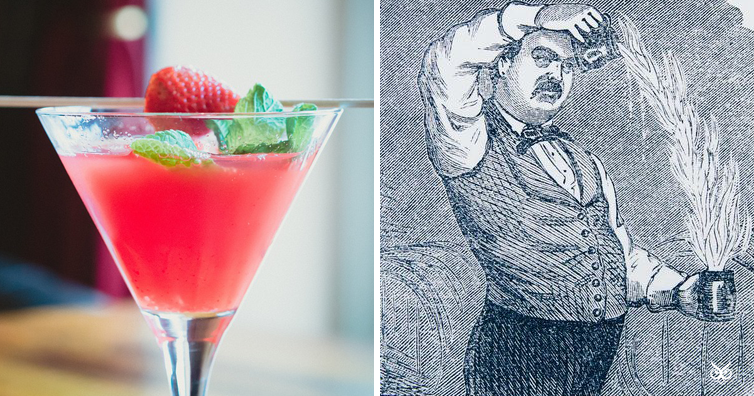On May 13th 1806, Harry Croswell, the editor of the NY based newspaper Balance and Columbian Repository, wrote an article on “What is a cocktail?”. His answer: “Cock-tail is a stimulating liquor, composed of spirits of any kind, sugar, water, and bitters”.
But what’s the story behind the name? Why cocktails?
Well, because here at I’m A Useless Info Junkie we are a huge cocktail lovers, we decided to look into it and here’s what we found. (the article continues after the ad)
First of all, let’s start with the myths. There are several theories as to the origin of the term but all of them seem to be pure speculations with no direct evidence to support them. According to one account, the name originated from a mispronunciation of the French word for egg-cup (coquetier) allegedly because New Orleans apothecary Antoine Peychaud was serving his mixed drinks in eggcups. Another common theory is that cocktails derive from the term “cock tailings”, the practice of combining what’s left in the barrels into a single elixir (barrel’s spigot was sometimes called ‘cock’). Others say it’s because the very first mixed drinks were garnished with the tail of a rooster. However none of this theories seem convincing enough.
To find the most credible answer to our question, we need to look into the research made by David Wondrich, one of the most respected and authoritative cocktail historians. While searching the origin of the term, Wondrich found that ‘cock-tail’ was a nickname for a beverage called ‘ginger’. More specifically, in 1798, a British newspaper wrote that ‘ginger’ was the official name of the beverage and ‘cocktail’ was the slang term. So why this ‘ginger’ thing was nicknamed cock-tail?
The answer is a bit distasteful but hey, sometimes history is like that. In his book A Classical Dictionary of the Vulgar Tongue, author Francis Grose defines the verb “to feague” as to “ginger up a horse’s fundament, to make him lively and carry his tail well.” Surprisingly, this was common at the time as horse dealers would do this before exhibiting a horse for sale, as a cocked-up (raised) tale was seen as a sign of a spirited horse.
Confirmation that feaguing and “cock-tail” are indeed related is provided by a little piece of political satire printed in 1790 in a provincial English newspaper, in which the writer, deploying the term in (I hope) the figurative sense, claims that a certain clergyman “hath been guilty of monopolizing all the ginger and pepper in the neighbourhood, to make the asses who vote for Sir Gerald Vanneck cock their tails.” That’s also how “cock-tail” seems to be deployed in The Prelateiad, an almost impenetrably obscure Dublin verse satire from 1789, which refers to cayenne pepper’s “cock-tail virtue.”
Is this the true origin of the cocktail? We’ll never be 100 percent sure, but this is as close as we can to the true origin of the term.
So, what do you think? Does this make sense to you?
If you like what you read, then you will definitely love this one: Why Prohibition Era Bars Were Called ‘Speakeasies’?
Photo: Free-Photos / Pixabay, Wikimedia
Photoshop: I’m A Useless Info Junkie
Sources: ANCIENT MYSTERY REVEALED! THE REAL HISTORY (MAYBE) OF HOW THE COCKTAIL GOT ITS NAME | Cocktail (etymonline) | What’s the Origin of the Word “Cocktail”?



